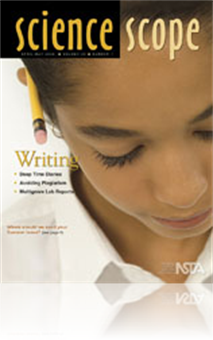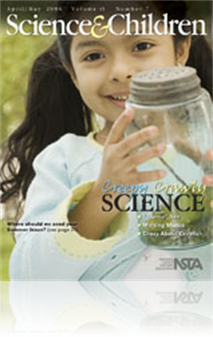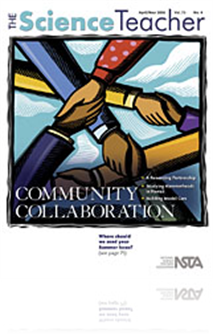All Resources
Journal Article
Tech Trek: Wordsmiths on the web
Based on authors Bob Tierney and John Dorroh's practical suggestions for promoting student writing and the learning of science, this column highlights a variety of websites that involve students in similar activities designed to help them become bett...
Journal Article
Science 101: If an insect grows to human size, will it have superhuman strength?
If insects grew to gigantic proportions, could they take over the world with their super-strength? To find and understand the answer, you have to understand a bit of basic geometry and how it applies to all kinds of organisms of different sizes....
Journal Article
Creating Deep Time Diaries: An English/Earth Science Unit for Middle School Students
Students love a good story. We all do. That's why incorporating literary fiction that parallels teaching goals and standards can be so effective. In the interdisciplinary, thematic six-week unit described here, the fictional book The Deep Time Diarie...
Journal Article
The ability to clearly communicate what was learned as the result of an experiment is a key component of science in general, not just science in the middle school classroom. The trick in the middle school classroom is teaching students how to write w...
Journal Article
Teacher's Toolkit: Teaching for transferal
An area of cognitive science that may one day help connect neuroscience and education is the concept of transferal. Transferal refers to how the skills and knowledge learned in a classroom can be synthesized and taken into the real world. Of specific...
Journal Article
Learning to Make Systematic Decisions
How do communities deal with the needs of a growing population? How do they manage limited resources like land, energy, and water? How do they balance the needs of humans against the needs of native ecosystems? The case-based, environmental science c...
Journal Article
Tried and True: Write it, do it
Effective writing is a keystone in the process of developing scientific knowledge. Scientists must be able to successfully communicate their findings so colleagues can confirm the authenticity of their claims through the replication of experiments. S...
Journal Article
Every Day Science Calendar: May 2006
This monthly feature contains facts and challenges for the science explorer. ...
Journal Article
"'Ooh, these things give me the willies, and I am not getting near them." "Wonder what those things are and what they eat?" Statements like these were heard amongst preservice students as they embarked on "bug" research. This article offers insight...
Journal Article
This article describes an alternative way of testing--a performance assessment--that is different both in process and goals from typical tests, but closer to what teachers believe assessment should be. Teachers who have helped to create, refine, and ...
Journal Article
Collaboration with Community Partners
Collaborations with community partners make problem-based learning experiences more authentic and exciting for students while ensuring that the experience is consistent with the community’s needs and interests. The authors describe a problem-based ...
Journal Article
Editor's Corner: Community Collaboration
Science activities that take students outside the school walls can combine the best aspects of service to the community, problem-based learning, and lessons in good citizenship. Over the past half-decade, The Science Teacher (TST) has published more ...





